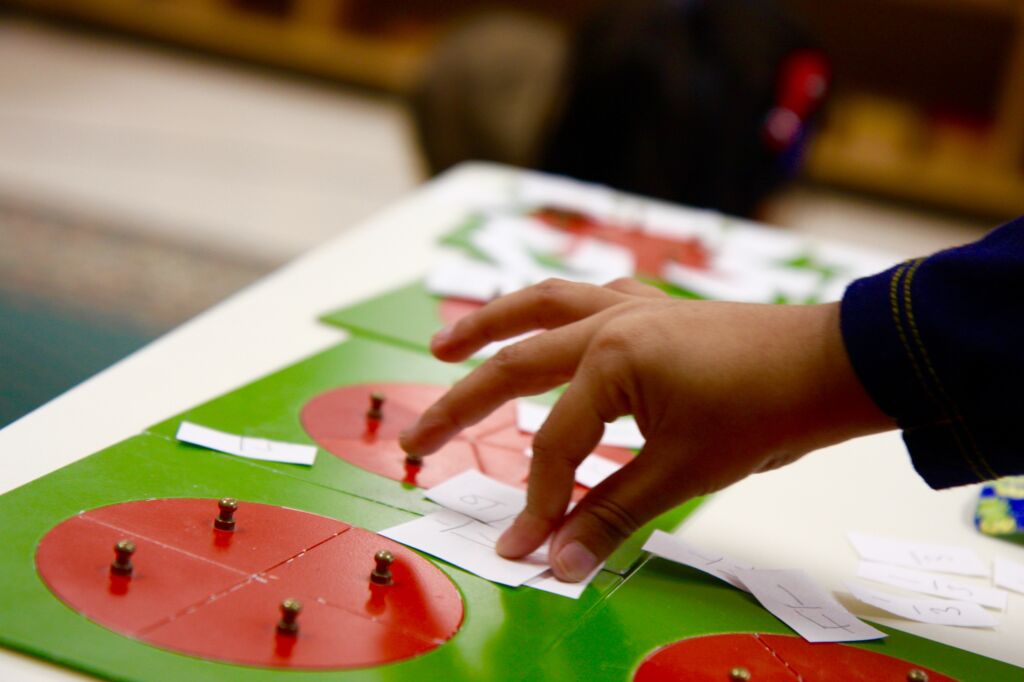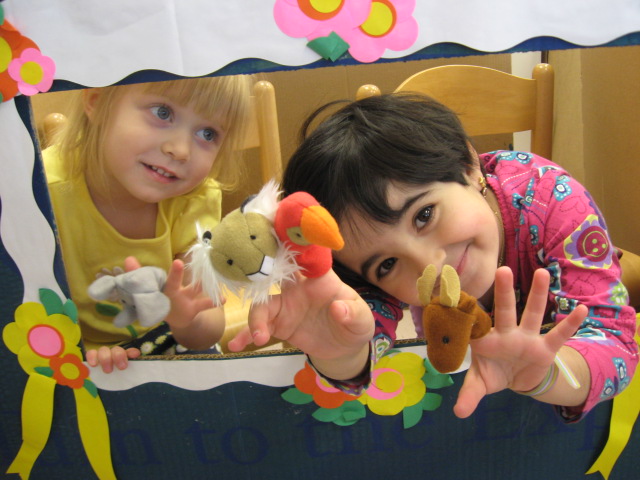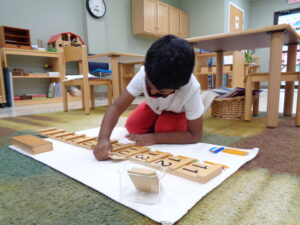PROGRAMS
eBridge Montessori School offers a full range of Montessori programs.
- Infant Program for 6 weeks to 15 months. During the first fifteen months of life our program supports infants in the natural drive toward independence including: control of movement, feeding, socialization and language development. Care and learning are individualized and care is taken to maintain an appropriate level of stimulation.
- Toddler Program, for 15 months old to 3 years old. The first three years of life are a time of rapid development. The Montessori toddler community fosters curiosity, social interaction, independence, language development, as well as fine motor and gross motor development.
- Primary Program, for 2 years nine months old to 6 years old. From ages three to six children have the extraordinary ability to absorb knowledge from their environment. In a Montessori primary classroom, children develop socially and intellectually while engaging in their purposeful work.
- Elementary Program, for 6 to 9 years old. The Montessori elementary curriculum is called Cosmic education. It tells the story of the interconnectedness of all things. It provides students with a framework to understand and explore the universe and their place within it. The contents of the curriculum will also help students develop a global perspective and vision.

Infant Program
The infant classroom is specially designed for infants from 6 weeks to 15 months old to support infant’s development of movement, coordination, balance, eye-hand coordination, and visual, auditory and tactile stimulation. Children are free to explore their world through their senses of taste, touch, smell and sight. We give children independence by placing all activities on low shelves, allowing them to take part if they choose.
Younger children are placed on movement mats, by mirrors and mobiles. The mats allow children the freedom to move all parts of their body. By looking at themselves in the mirror, they begin to understand who they are and develop a sense of their own body scheme. A mobile not only teaches children about their world, but also builds self confidence, self esteem and curiosity. Once they realize their ability to touch or kick the mobile, they realize they have the power to change their environment. A teacher is always present in areas where younger children “work,” and children in this area are separated from the curious walker by shelving and larger activities. Mobile children are free to move around the environment and choose activities.
Infants can join four or five days a week, either half day from 8:30am to 12pm or full day from 8:30am to 3pm. Infants are on individualized schedules in coordination with their home schedules. As they approach readiness to join the toddler community they transition to the toddler schedule for food and sleep.
Toddler Program
Our Montessori Toddler Community is for children age 15 months to 3 years old. Toddlers can come to the school 4 or 5 days a week, either half day from 8:30am to 12pm or full day from 8:30am to 3pm. We offer after school care for toddlers from 3pm to 5:30pm.
The eBridge toddler program provides young children with the experience of socializing and learning within a small group of similarly aged peers. Toddlers in the Montessori environment are offered opportunities for exploration, discovery, and learning based on their individual developmental needs.
The furniture and materials in the Montessori toddler environment are appropriately sized and ordered to help the young children develop concentration, coordination, and independence. The children become very comfortable and content within the environment since it is calm, ordered and consistent for them. Toddlers who experience a Montessori environment gain self-help skills, high levels of self-confidence and self-esteem, a feeling of competence, self control, support for language development and truly fall in love with learning. When these skills are developed at such a young age the child is prepared to be successful in all future social and learning environments.
A Typical Day
8:00– 8:30 Morning care
8:30 – 8:45 Arrival time
8:30 – 10:30 Montessori work time
10:30 – 11:00 Morning snack
11:00 – 11:30 Outside time
11:30 –12:00 Gathering for stories and music
Noon Dismissals
12:00 – 12:30
12:30 – 3:00 Lunch
Nap time
3:00 Full-day dismissal
3:00 – 5:30 Afternoon snack, recess, after school activities
Primary Program
Our primary program is for children from 2.9 to 6 years old. Children attend school Monday to Friday either half day, from 8:30am to 12pm, or full day, from 8:30am to 3pm. The multi-age classroom is a unique and perfect environment that allows children to start as beginning learners and develop into responsible role models and leaders. Ideally children join primary program at 3 years old so that they go through the full primary curriculum and finish the kindergarten program in the Montessori environment. Although some children who found Montessori at age 4 and 5 can still benefit tremendously from the Montessori education.
During the primary work cycles children receive small group and individual lessons and practice work on which they have had lessons. Children move at will during this time choosing work with the support of the teachers, socialize and meet basic needs at will. This time closes with a group gathering for music and stories.
The afternoon work cycle is another extended period for lessons and practice for the kindergarten and preK children while the younger children are in the nap room. This is when many of the more involved lessons in the content areas will be first introduced. It opens and closed with a gathering for stories, music or other sharing.
Daily Schedule
8:00 – 8:30 Morning Care
8:30 – 11:30 Morning Three-hour Work Period
11:30 – 12:00 Outdoor Recess & Half-day dismissal
12:00 – 1:00 Lunch & Clean up
1:00 – 3:00 Afternoon Work Period/ Nap & Full-day Dismissal
3:00 – 6:00 After-school Recess, Snack & Activities
6:00 School Closed
Practical Life
As children grow they are naturally motivated to do as much as they can for themselves. They strive to take care of themselves and the world around them independently. The exercises of Practical Life help children fulfill this desire, which is every bit as important developmentally as the acquisition of language or future capacity to reason. These activities are designed to support functional independence and serve to aid the child in gaining control of the hands, exercise and strengthen memory through experience following sequences, and supports a growing awareness within the child of the relationship between practice and learning through direct experience.
Practical Life exercises include many tasks children see as part of the daily life in their own homes: washing and ironing cloths, doing dishes, arranging flowers and washing tables. Another aspect of Practical Life is the human component of learning to get along with a group. We call these exercises Grace and Courtesy lessons. These lessons help children to know how to act properly in a social setting.
Sensorial
Dr. Montessori designed the Sensorial materials used in the primary classroom. Dr. Montessori carefully selected each material and connected activity to clearly demonstrate qualities found in the world such as: color, shade, size, shape, texture, musical pitch, geographic features and botanical shape. Children explore and discover concepts about the world around them using these materials. Teacher solidify their learning through language lessons that support children in using the concepts to share orally and through reading and writing as they are ready.
Language
The Montessori approach to language in the Primary classroom is multifaceted. We provide an experience of rich and precise language through spoken activities, games, stories, songs, poems and conversations. We address each child’s growth towards fluent reading and writing over time from a holistic viewpoint that includes preparation of the mind, hand and eye.
“When the children come into the classroom at around three years of age, they are given in the simplest way possible the opportunity to enrich the language they have acquired during their small lifetime and to use it intelligently, with precision and beauty, becoming aware of its properties not by being taught, but by being allowed to discover and explore these properties themselves. If not harassed, they will learn to write, and as a natural consequence to read, never remembering the day they could not write or read in the same way that they do not remember that once upon a time they could not walk.”
-Dr. Maria Montessori
Mathematics
The mathematics materials developed by Dr. Montessori help the child learn and understand mathematical concepts by working with concrete materials. This work provides the child with solid underpinnings for traditional mathematical principles, providing a solid foundation for abstract reasoning. Children are able to build their mathematical abstractions from tangible experiences, which makes understanding deeper and them more proficient in the long run.
Cultural Extensions
Geography, History, Biology, Botany, Zoology, Art and Music are presented as extensions of the sensorial and language areas. Children learn about other cultures past and present, and this allows their innate respect and love for their environment to flourish, creating a sense of solidarity with the global human family and the Earth.
Experiences with nature in conjunction with the materials in the environment inspire a reverence for all life. History is presented to the children in part through art and music.
Elementary Program
The Montessori elementary environment balances the child’s developing imagination and powers of abstraction with concrete and hands-on materials. Each material has its structured sequences to lead to discovery and understanding.
Like the Montessori primary class, the Montessori lower elementary class is also a multi-age class with children from 6 to 9 years old. Within the classroom, students have the freedom to explore all the materials in all subject areas, and pursue their own interest at their own pace. Our teachers observe children and guide children into areas of natural interest.
The Cosmic education in the Montessori elementary curriculum sets the stage to develop a global view on how everything in our cosmos is dependent and interrelated to others and our place in it. This understanding brings with it a desire to contribute to the world with wisdom and compassion. The elementary curriculum is built around the five Great Lessons given at the beginning of each year:
1. The Story of the Universe explores the formation of the stars, the sun and the earth.
2. The Coming of Life introduces the children to the idea that life has not always existed on our planet, and that its coming signaled a new balance on the earth.
3. The Coming of Humans emphasizes the coming of humanity to the earth as a thinking, loving, working form of life.
4. The Story of Communication in Signs presents language as a part of history, investigates the various milestones that served to create the alphabet.
5. The Story of Numerals introduces the child to the history connected with our numerals.
The great lessons are connected stories that span the enormous historical frames of time and space. From this core of story framework emanate the details of the disciplines: science, mathematics, social studies, and language. The story provides an overview, stimulates the imagination and provides holistic lessons. The students then study the subjects in detail: biology, chemistry, geology, geography, physics, history, art and music. Because of the unifying thread of the Great Lessons, no subject is studied in isolation from the others. Throughout all subjects, the Montessori teacher has the opportunity to instill in students a sense of being connected to all things in the universe
As an extension of classroom study, when our classroom does not contain the answers to all of the students’ questions, students will go out based on individual or small group interest. Students plan their own “going out” excursions, call the institutions to be visited, and work out their transportation needs. This experience help them to connect with outside world, gain further information and stimulate imagination for further study.
Enrichment Classes
In the past several years, many eBridge students have benefited from a variety of after-school enrichment classes offered by our dedicated and talented parents.
Following is a list of our enrichment classes:
Summer Program
eBridge Montessori School is staffed with a group of well trained, highly professional, enthusiastic, loving, and committed teachers. All lead teachers are trained by AMI training centers. AMI is the training and regulatory group founded by Dr. Montessori during her lifetime in order to maintain the highest standards of her philosophy.


